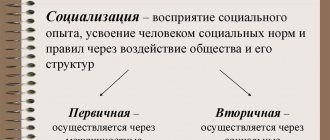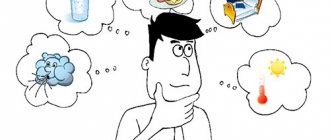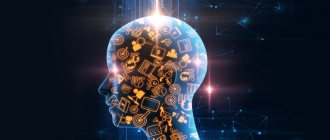In this article we will tell you:
- Differences between freedom of choice and human free will
- Freedom of choice of a person according to the law
- Does a person always have freedom of choice?
- Steps to gaining personal freedom of choice
- 5 books about human freedom of choice in society
Each of us is endowed with freedom of choice from birth. But do we know how to use it? And are we interpreting it correctly? They say that a person's freedom of choice ends where the freedom of another begins. It turns out that others also influence our choices.
Indeed, until the moment of growing up, the freedom of choice of a little person is limited by the will of adults. However, as we get older, we are sometimes forced to choose under the influence of external circumstances. Does this mean that a person’s freedom of choice operates only in the field of his personal primitive decisions, for example, what to wear today or what movie to watch before bed? Let's figure it out.
Differences between freedom of choice and human free will
Initially, it is necessary to give a clear definition of the concept of “will”. This is its first and main difference from choice. Will denotes the conscious achievement of a goal. The choice can be made instinctively or mechanically. For example, when a person is asked to perform some action, he may do it without being aware of why and why it is necessary.
In addition, a person’s freedom of choice presupposes the presence of two or more options, one of which can be preferred. This is the second difference. The implementation of will can be based on a creative search or the creation of new, not initially proposed for consideration, options for solving a problem or task.
Every person has freedom of choice. However, circumstances often dictate their will, and a person acts according to the current situation. Does it mean that it is the existing conditions that determine a person's choice? Not at all.
There are two possible ways in which a person acts in any given situation. The first assumes that life is built on the basis of submission to circumstances. The second is based on moving towards a goal. Of course, life circumstances also play a role in this case. They can become a hindrance and slow down the movement towards the goal. However, the choice itself will depend on what the person is striving for, and not on the existing situation.
Human free will requires a high level of development and self-organization from him. To implement it, you need the ability to consciously set a goal and make significant efforts to achieve it. But at the same time, it should be understood that in those situations where circumstances seem insurmountable, it makes sense to change the strategy and develop new ways to solve the problems. Following an ineffective course blocks the expression of will. Without such a restructuring, a person will only have the freedom to choose from the options offered.
It is important to understand that will is not an innate, but an acquired quality. She's training. You need to set goals for yourself and create the right strategy for achieving them. Only through these actions can one gain both free will and freedom of choice.
What is inner freedom?
Inner freedom is the ability to be independent in your own inner world. After all, most barriers begin with psychology, with fears, complexes and stereotypes. Liberation from them is the first and most important stage on the path to gaining independence and independence from others.
This concept should not be confused with detachment from the world. Absolutely not, because by contacting the surrounding reality, you can fully realize your freedom. How to talk about independence, if not, on whom to depend? This is already loneliness. If it is chosen deliberately, well, that's one thing. And if someone simply runs away from others, obeying their phobias and complexes, this is already a problem that should be dealt with.
Freedom of choice of a person according to the law
In some countries, a person's freedom of choice is regulated by an article of the constitution. Legal regulation of the life activities of all members of society is based on the conscious behavior of citizens. In other words, on free will and its manifestation.
According to Chapter 2 of the Constitution of the Russian Federation, every citizen of the country has free will and can say what he thinks and do those actions that he considers necessary. And, therefore, he bears responsibility for his actions, including illegal ones, for which punishment is imposed. What then is the freedom of choice of a person?
3 important steps
which every woman should go through
Anika Snagovskaya
Author and presenter of women's trainings on harmonizing feminine energy. Master of removing limiting beliefs and master of constellations.
I have prepared three lessons for you that will help you better understand yourself, remove the restrictions that prevent you from feeling loved and living happily.
01
Video lesson with meditation: 5 states of femininity
You will learn about 5 female states that exist in every woman, how they manifest themselves and which archetypes are most manifested in you and which are not developed.
02
Video lesson + meditation: How to let go of past relationships
I’ll tell you what you need to do to free your heart from old feelings and break the energy threads connecting you with your past partner.
03
Audio recording: Neuro-af
Thanks to this neuro-affirmation, you can regain self-love and feel sincere gratitude and happiness for every day.
✕
Top 3 useful materials that will help you know yourself better
And start a new, happy life for yourself.
Video lesson with meditation: 5 states of femininity
Video lesson + meditation: How to let go of past relationships
Audio recording: Neuro-af
Take your gifts!
In this case, it is worth clarifying that there is a possibility of misinterpretation of this concept. Freedom of choice is a right that even slaves have (despite the limited number of unacceptable options). This has nothing to do with lawlessness and the ability to do anything, even something that is contrary to legal norms. To understand some of the features of illegal activities, it is necessary to consider in detail what freedom of choice means in children's and adults' understanding.
Each person has a part of their personality that includes behavioral patterns, fears and ideas formed in childhood. This is the so-called inner child. He is free. In addition, he is characterized by sincere curiosity.
Despite the fact that any child is born free, the awareness of how the right to choose differs from chaos comes to him only at a more mature age. These are the features of the process of personality development, which in some cases fails, and people rely on their child’s worldview all their lives.
Infantility is primarily manifested in the fact that freedom of choice in a person’s life is interpreted as indulgence in one’s own desires without awareness of the negative consequences of one’s actions.
In some cases, when a child is punished for a bad act, he may misinterpret the parents' intentions and fail to connect cause with effect. At this age, a person is not yet responsible. A small child has not learned to determine which actions are good and which are bad.
What is freedom of thought?
Do you want to make better decisions, find your ideal career, realize your maximum potential and receive instructions for individual development?
?
All this can be done using the Human Design
. Build your map and get basic transcripts for free.
Freedom of thought is the natural right to independently form one’s own beliefs. Its essence is very similar to the previous concept. Our thoughts shape our inner world. Fantasies, dreams and aspirations are a secluded refuge in which you can hide, even in moments of physical enslavement. And as long as someone is able to think freely, he cannot be considered completely subservient.
Therefore, all totalitarian systems in the world began their rule precisely by imposing their ideology. Even now, invisible wars are being waged on the minds of people, as consumers, voters, fans, etc. That is why it is so important to approach your life consciously, not to stop in self-development and gaining new knowledge. After all, the smarter and more experienced an individual is, the more difficult he is to be manipulated by hidden people, the freer he is in his head.
Steps to gaining personal freedom of choice
There is a certain sequence of actions that allows you to independently exercise a person’s freedom of choice. These are the following steps:
- Step 1: Make your decision making easier: Flip a coin. Less time and other costs for thinking.
- Step 2. Discard doubts that your choice may be wrong. If you succumb to them, the unconscious will begin to control you.
- Step 3: Make lists of tasks that will fit your plans. If the goals are clearly defined, the time required to make a decision is minimal.
- Step 4. You must rely on a reliable source and knowledge base. If your level is insufficient, seek the services of a professional who can help you.
What other freedoms are there?
In addition to the varieties listed earlier, we can talk about a number of other freedoms:
- Religion;
- Expressing your thoughts;
- Movement;
- Access to information;
- Creativity;
- Ownership of your body;
- Self-determination;
- Voli.
The importance of these rights in a democratic society is confirmed by the presence of a number of laws that help citizens realize themselves.
Choice of religion.
It gives each of us the opportunity to independently determine who to believe in, or not to believe at all. Although the church is inextricably linked with the state, in developed countries of the world every citizen has the right to choose his own system of religious values.
Take a character test
Free expression of your thoughts.
Regardless of whether someone wants to express their opinions orally or in writing, they have the right to do so. Censorship is a reference to totalitarian regimes. On the other hand, there is a moral and ethical side to this issue. After all, sometimes you can say or write something offensive towards another. So, it is important to understand where the rights of one intersect with the interests of another.
Unhindered movement.
The embodiment of a decision is its implementation through action. For example, go somewhere, go to a certain place, etc. Legislation controls this, which, in fact, infringes on some desires. But, when we are talking about millions of people, it is actually very difficult to establish a balance when the personal space of one does not enter into the territory of another. After all, it is very important not only to fight for opportunities, but also to respect the freedom of the people around us.
Right of access to information.
Information hunger depletes a person no less than a real lack of food. The brain is designed to receive new information, regardless of its types and forms. Political news, sporting events, the next episode of a television series, etc. The main thing is the endless flow of data. Since such a need is inherent in our nature, it means there must be a right to satisfy it.
Opportunities for creativity.
There is no more democratic way to reflect your inner world than to engage in creativity. Literature, fine arts, sculpture, etc. All this helps to be more fully in contact with the outside world and realize one’s inner potential. And even if someone may not like it, no one has any reason to infringe on this type of self-expression.
The right to own your body.
A sensitive topic. On the one hand, the body is our property. On the other hand, rash decisions to transform it can also impose a certain social connotation. For example, some types of tattoos that are considered unacceptable in society. Everyone can do some of them, but as a result, opportunities for business communication or going to the city beach will be limited. Because other people simply won't want to talk or even be in the same area.
Freedom of self-determination.
The right to independently control your consciousness and mental processes. We are talking about the complete autonomy of a person in his conscious self-development. Everyone has the right to move in the direction they are interested in.
The most important question
The issue of free will is a cornerstone issue of philosophy and worldview, on which the lives and destinies of people ultimately depend.
When you start talking about free will, most people look at you like you're an idiot. Half of the people do this because they don’t quite understand what they’re talking about. The other half comes from being understood too well. In order to be clear to the first half and lull the vigilance of the second, we will formulate this question in the most harmless form, which nevertheless retains all the severity of the problem. So:
Can we influence our future?
There is nothing seditious in this question. Any sane person should try to answer it before doing anything in his life. At least for myself. Even if this means making a shaman’s drum from the upholstery of your office chair. And go to the tundra to dance around the fire and drink fly agaric tincture.
Second dialectical barrier
When they talk about dialectics, they usually cite the following related concepts: hot-cold, heavy-light, good-evil.
But in my opinion, these are weak dialectical pairs. There are stronger dialectical concepts. They cannot be mixed as easily as water in a gang. And the transition between them is not so easy. And I would call them dialectical barriers. As examples: form and content, strategy and tactics, matter and consciousness, information and energy, and, of course, predictability and freedom.
Let’s take a closer look at the pair – information and energy. It is quite obvious that one cannot exist without the other. Any information has an energy carrier. Any energy carries some information. Despite the complexity and elusiveness of this relationship, humanity has overcome this barrier. And now we can design devices that combine energy and information in any proportions we need.
The concepts of determinism and freedom belong to the same dialectical barrier. Someday we will overcome this too. And we will design devices that combine predictability and freedom in the form and in those relationships that will be useful to us. And then artificial intelligence will become really strong.
It’s not my fault, it just came...
First, I’ll try to understand a little about the humanitarian side of the issue.
I understand that the following reflections will not add or subtract anything in terms of a scientific approach to free will, but I will still speculate about it. If the meaning of free will for the exact sciences can still be somehow disputed, then for the humanitarian branches of knowledge, free will generally constitutes their entire content. This is especially true for the theory of society and law.
Let's assume that scientists would reveal all the true physiological causes of human behavior. What would a trial look like in this case?
Defendant, tell me, why did you steal a wallet with money from a passerby? “It’s not my fault, Your Honor, I was afraid that I would remain hungry.” You know, hunger is a basic human instinct. — Were you hungry at that moment? - No, but I had a fear of future hunger. This was developed as a result of evolution. Here is a study where this is written in detail. - Well, okay, why did you beat him up after that? - Well, you understand, I didn’t like his face. The tribal slot system worked. He seemed like an enemy to me. There is also one completely reliable study about this. - Why did you hit him with a knife? - This is post-motor aggression. The adrenaline level jumped. Cortisol again. Here is a certificate from my endocrinologist. - Why did you hit him with a knife again (a total of nine times)? - Well, it’s quite simple, Your Honor. This is simply a motor reflex, with a positive feedback loop. Pavlov also wrote about this. It's a shame not to know in your position.
If you think this is absurd, then you are mistaken. There are already known cases of acquittals for diabetics who carried out illegal actions when their sugar levels were low. It is with these facts that the famous researcher of the biochemistry of monkeys and humans, Robert Sapolsky, often begins his lectures.
Are there teachings or theories in favor of free will?
Of course they do exist. The concept that is the opposite of determinism and says that the future is not determined by the past is called indeterminism (from the Latin in - not , negation). One of the popular philosophies that adhere to the principles of indeterminism (uncertainty) is libertarianism .
According to libertarianism, all things are divided into thinking things and extended things . Extended things are in space (have a certain extent) and are determined by the past and the laws of nature. But thinking things - thoughts, will, consciousness - are not located in space and are not determined (that is, not determined) by the laws of the material world.
I think, therefore I exist. Rene Descartes.
Since will is a thinking thing, not located in space and not determined by it, then, according to the views of libertarianism, people endowed with free will also have freedom of action.
Critical thinking as part of free will
The abundance of the material world for each person individually creates different visions of the situation. However, for most, this state of affairs relaxes and turns off a critical attitude. People stop thinking, monitoring the current moment and ultimately lose touch with the spiritual world.
As a result of the imbalance, critical thinking is turned off. The inability to soberly assess the situation leads to a return to the old path of attachment to constant negativity. As soon as control over your agreement between soul and mind is lost, willpower is lost.
It is difficult to admit decisions from your past were wrong and to show detachment. In such cases, it is very difficult to monitor yourself and critically evaluate your thoughts and actions. To further strengthen and consolidate addiction, people are given “educational teachers.”
Does a person have free will in this situation? There is a difference when a person sends a request to Space. The essence of this request may be for help in learning to solve problems independently. Other applications contain opposite wishes:
- earn and save money,
- find true love,
- give them health
and no one realizes that they already have everything they ask for.
You just need to show free will and stop stepping on the rake, over and over again. For some reason, most people decide that repeating their actions will bring them a different result. Few people work on mistakes and do their homework. No critical thinking, lost somewhere along the way.
And about mentors, I will say the following: Whatever “wants” a person sends into the energy information field, these are the teachers he receives! If you want to earn money, they will give you a “teacher” who will extract all the money from you, and this will be a lesson. So that you do your homework and learn.
If you want to get the love of your life, the Universe will give you such an individual who will make your existence unbearable. So that you learn to love in another person everything that you don’t like about yourself. This is how free will and choice manifests itself:
- abandon the lesson and proceed as usual,
- or look at yourself objectively.
Why prove the obvious?
If we take me, for example, then I don’t need evidence of free will.
I feel it like the five fingers of my hand. Sometimes I look at my hand, move each finger individually, and then make a fist. When my hand obediently carries out my orders, I understand that I am still able to change something in this world. And let them tell me that this is a phantom feeling, like from an amputated limb. I know that I have freedom, just as I know that I have thoughts and emotions. Remember the story of how the wise men gathered and began to prove to each other that motion does not exist (Zeno’s famous paradox). One sage, outraged by these conclusions, stood up and demonstratively walked back and forth, and then left the hall altogether.
I think that this sage, if they began to convince him that he had no freedom, would simply bloody someone’s nose. I remember a joke.
At the trial, a woman is asked: “Why did you hit your husband with a frying pan?” - Why does he tell everyone that I’m so predictable?
But what is obvious to some may not be obvious to others. Moreover, for others, something completely different may be obvious. And even if the same thing is obvious to everyone, it never hurts to talk about it, using various arguments of varying degrees of scientificity and emotionality.
The period of "constancy".
A period when the results of life are in a certain range of values, and the ceiling does not break through, even if you crack. It is possible that this is a period to gain some ultimate level of skills, experience or knowledge in order to reach a new level, or maybe this is a period to stop in the endless race for income and put things in order in your head and in the heart.
Not only I, but also my friends encountered this phenomenon. It is interesting that when such a period comes after 30 years, the decision is often made to stop banging your head against the wall, calm down, direct your efforts to your personal and spiritual growth, relax, wait for the next period, accept life as it is.
Even in such a period, when it seems that circumstances are stronger than you, it is fraught with completely giving up.
Level of awareness of the consequences of your decisions
According to the Laws of the Universe, our task as parents is to create favorable living conditions for our children. Not only for sons and daughters , but also for the second and third generations ahead, at least. Most of the many will perceive my information in their own way. And this majority will come to the following conclusions about benefits:
- monetary wealth,
- provision of real estate,
- by car.
As a rule, the list is meager and ends with material things. However, if in the process of becoming your child receives all this, then, as a rule, he will be deprived of other lessons. Usually, material accumulation and consumerism give birth to absolutely weak-willed and controllable biorobots . It turns out that the parents and the external environment did not educate them enough.
The lack of free will is passed on to the next generation. The apple never falls far from the tree. It is worth enormous efforts and painful blows from life to change your surrounding world. Not many people manage to achieve positive results. It would be more correct to say that only a few out of a thousand.











